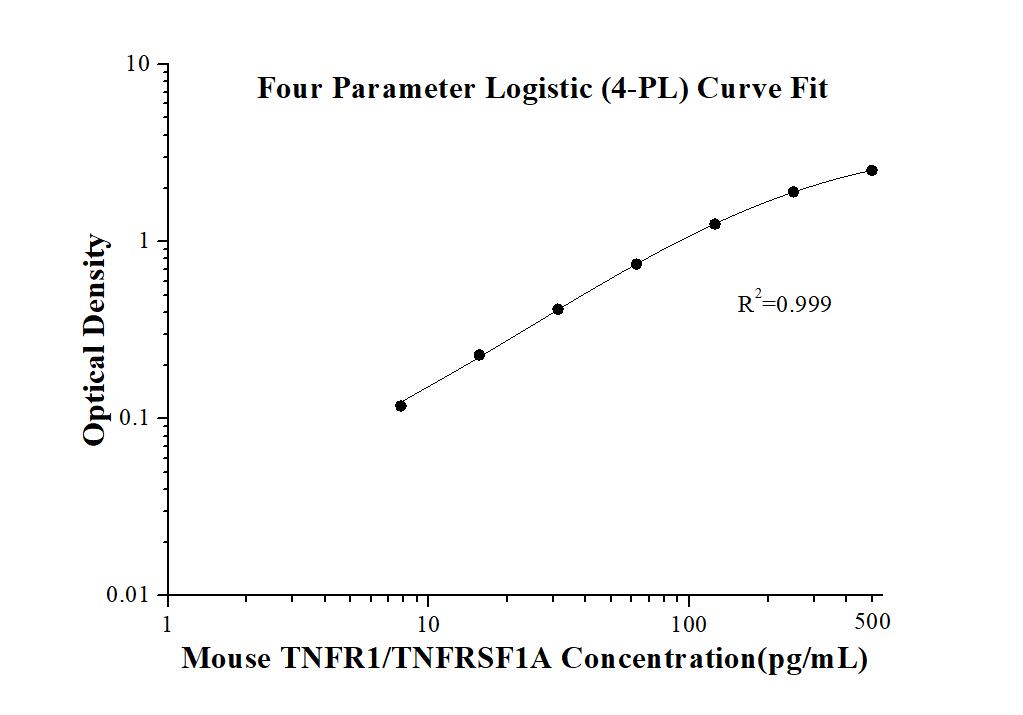Mouse TNFR1 ELISA Kit
Sensitivity
0.5 pg/mL
Range
7.8-500 pg/mL
Reactivity
Mouse
Cat no : KE10065
Synonyms
CD120a, FPF, p55, p55 R, TNF alphaR1, TNF R, TNF R I, TNF R1, TNF R55, TNFalpha R1, TNFAR, Tnfr 2, Tnfr1, TNFR60, TNFRI, TNFRp55, Tnfrsf1a
Validation Data Gallery
Product Information
KE10065 is a solid phase sandwich Enzyme Linked-Immuno-Sorbent Assay (Sandwich ELISA). The MouseTNFR1 ELISA kit is to be used to detect and quantify protein levels of endogenous mouseTNFR1. The assay recognizes mouseTNFR1. An antibody specific for mouseTNFR1 has been pre-coated onto the microwells. The mouseTNFR1 protein in samples is captured by the coated antibody after incubation. Following extensive washing, another antibody of biotinylated specific for mouseTNFR1 is added to detect the captured mouseTNFR1 protein. For signal development, Streptavidin-HRP is added, followed by Tetramethyl-benzidine (TMB) reagent. Solution containing sulfuric acid is used to stop color development and the color intensity which is proportional to the quantity of bound protein is measurable at 450 nm with the correction wavelength set at 630 nm.
| Product name | Mouse TNFR1 ELISA Kit |
| Tests | 1 X 96 well plate |
| Sample type | Serum, Plasma, Cell culture supernates, Tissue homogenates |
| Assay type | Sandwich |
| Sensitivity | 0.5 pg/mL |
| Range | 7.8-500 pg/mL |
| Reactivity | Mouse |
| Tested applications | Sandwich ELISA |
| Gene ID (NCBI) | 21937 |
Recovery
| Sample Type | Average | Range |
|---|---|---|
| Mouse serum | 98% | 80%-123% |
| Cell culture supernates | 96% | 71%-124% |
IntraAssay
| Sample | n | mean ( pg/mL) | SD | CV% |
|---|---|---|---|---|
| 1 | 20 | 219.9 | 6.3 | 2.9 |
| 2 | 20 | 52.2 | 1.3 | 2.5 |
| 3 | 20 | 12.1 | 0.4 | 3.0 |
InterAssay
| Sample | n | mean ( pg/mL) | SD | CV% |
|---|---|---|---|---|
| 1 | 24 | 205.8 | 7.4 | 3.6 |
| 2 | 24 | 51.9 | 2.1 | 4.0 |
| 3 | 24 | 12.5 | 0.6 | 4.7 |
Background Information
Tumor necrosis factor (TNF) is a multifunctional cytokine that plays a key role in regulating inflammation, immune functions, host defense, and apoptosis. TNF signals through two distinct cell surface receptors, TNFR1 (TNFRSF1A, CD120a) and TNFR2 (TNFRSF1B, CD120b). TNFR1, which contains a death domain (DD) within its intracytoplasmic region, is thought to be the key receptor for TNF signaling. This receptor can be released to the extracellular space by two mechanisms, ectodomain shedding and constitutive release of full-length 55-kDa TNFR1. Soluble TNFR1 (sTNFR1) could function as TNF-binding protein, inhibiting TNF bioactivity.
Properties
| Storage Instructions | All the reagents are stored at 2-8℃ for 6 months or -20℃ for 12 months. Refer to the protocol for further storage instructions. |
| Synonyms | CD120a, FPF, p55, p55 R, TNF alphaR1, TNF R, TNF R I, TNF R1, TNF R55, TNFalpha R1, TNFAR, Tnfr 2, Tnfr1, TNFR60, TNFRI, TNFRp55, Tnfrsf1a |
